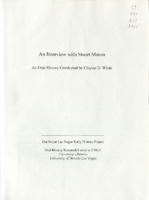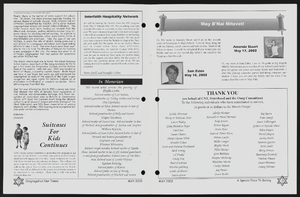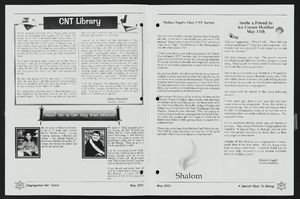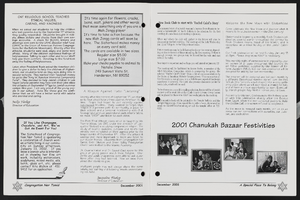Search the Special Collections and Archives Portal
Search Results
Goldfield Consolidated Mines Company Records
Identifier
Abstract
The Goldfield Consolidated Mines Company Records (1904-1930) consist of correspondence, invoices, receipts with voucher checks, mining leases, insurance policies, payroll accounts, published notices and articles. Also included is a monthly Goldfield Consolidated Mines reports ledger from February 1914 to October 1916 for mines located in the south central Nevada area. The collection primarily dates from 1904, before the consolidation when the boom in Goldfield was beginning in earnest, until 1919, when the company ceased its operations in Goldfield, although there are a few records post-1919 as the company continued to exist after the mines and mill closed down.
Archival Collection
Las Vegas African American Community Conversations round table interviews
Identifier
Abstract
The Las Vegas African American Community Conversations is a four-part conversation with local Las Vegans. The first part of the round table is moderated by Trisha Geran with a central theme of "Migration, Work and Community Emergence." The panelists discuss the early history of the African American community in Las Vegas, Nevada. They also discuss how and why their families moved to Las Vegas, most citing the economic opportunities as a major factor. The participants share their personal histories and family histories building up the African American community in downtown Las Vegas and the Westside. The second part of the round table is moderated by Sonya Horsford with a central theme of "Education, Economy, and Integration." The panelists discuss the Clark County School District pre- and post-integration. They discuss the hardships of the Sixth Grade Center Integration Plan on the African American community as well as discussing the differences in the school facilities. The round table participants also discuss the social services and social programs and the history of those programs from the African American perspective. They also discuss civic involvement and the various civic groups started by the panelists, and share discrimination they faced.
The third part of the round table is moderated by Claytee D. White with a central theme of "Civil Rights and Entertainment." The panelists discuss the racism and segregation present in Las Vegas and discuss how African American community leaders worked to integrate African Americans into the Las Vegas community. They discuss the 1969 riots in detail, and discuss African American entertainers and the entertainment industry. They share personal experiences working in the entertainment industry and discuss the importance of the local unions, such as the Culinary Workers Union Local 226, the International Alliance of Theatrical Stage Employees Local 720, and their contributions to the unions. The fourth and final part of the round table is moderated by Rachel Anderson with a central theme of the "Early African American Legal Community." The panelists discuss the foundations of the professional legal community in Las Vegas, noting the contributions of Charles Keller, Dr. William Bailey, and the Reverend Marion Bennett as driving forces for civil rights activism in Las Vegas. They share their experiences growing up in Las Vegas facing discrimination and segregation. Lastly, they share the changes they have seen and how both the legal and African African communities have grown.
Archival Collection

Transcript of interview with Jacob Snow by Stefani Evans and Claytee White, August 29, 2016
Date
Archival Collection
Description
In recalling his career in the public sector, Boulder City native Jacob Snow credits fellow Nevadans Robert Broadbent and Bruce Woodbury as two mentors who helped shape his world view. After attending Boulder City schools and serving a religious mission in Hong Kong, earning his Bachelor's and Master's degrees at Brigham Young University, and working as community development planner for the City of Provo, Utah, 1987-1989, Snow has lived and worked in Clark County. Snow's degrees in geography and urban planning and his experience in transportation directly benefited Clark County residents from 1989 through 2015; we continue to derive indirect advantage of his knowledge through his current consulting business. In this interview, he speaks to the ways infrastructure accommodated Southern Nevada's growth. He discusses McCarran's Terminal Three, the Las Vegas Monorail, UNLV's football stadium, the Bruce Woodbury Beltway, and the Fremont Street Experience. He explains the ethos of McCarran Airport; why the Monorail will likely never go to McCarran Airport; how Clark County financed the CC-2015 Bruce Woodbury Beltway, and why we see the concept of "complete streets" applied more in the City of Las Vegas and the City of Henderson than in Clark County. Snow discusses his work under Clark County director of aviation Broadbent as assistant director of aviation for planning at McCarran International Airport; his career as general manager of the Regional Transportation Commission, where he worked with Clark County Commissioner Bruce Woodbury, and his three years as city manager for the City of Henderson. In speaking of all three roles, Snow draws upon his knowledge of transportation as it grew and was shaped by his previous positions. And in all three roles, Snow exemplifies the lesson Broadbent impressed upon him early in his airport career: "[Y]ou've got to be able to bury the hatchet and build bridges.
Text

Transcript of interview with Rory Reid by Stefani Evans and Claytee White, July 13, 2017
Date
Archival Collection
Description
Rory Reid works in the Downtown Las Vegas building fully tattooed with a mural depicting a hand holding a bouquet of flowers of which the glowing central bloom is half brain and half heart. The story behind the mural is essential to understanding why the oldest of Landra and Harry Reid’s five children loves coming to work. Born in Alexandria, Virginia, he arrived in Las Vegas as a six-month-old with his parents and led a story-book life in the Reid house on Gretel Circle, down the street from Hansel Circle and right off Lilliput Lane. After attending Doris Hancock Elementary School, James Cashman Junior High School, and Ed W. Clark High School, he served a church mission in Argentina and studied international relations and Spanish and then law at Brigham Young University before returning to Las Vegas and joining Lionel Sawyer and Collins law firm. In this interview, Reid talks about administrative law, about leaving the firm to become an executive with Lady Luck Gaming Corporation, serving as Nevada Democratic Party chair for two years, and returning to Lionel Sawyer and Collins in 2000, where he remained until 2014. He shares his motivations for running for the District G seat on the Clark County Commission in 2002, and talks about the political climate in which he took office in 2003, a few months before fellow Commissioners Dario Herrera; Lance Malone; Erin Kenny, and chair Mary Kincaid Chauncey were indicted on federal charges following Operation G Sting. Following these highly public arrests, Reid focused on restoring faith in local government. In 2010, after two terms as Clark County Commissioner and Commission chair, Reid ran for Governor of Nevada as the Democratic nominee against Brian Sandoval. In that election, as Reid puts it, "the voters told me to do something else with my life," and he returned to his law practice. However, in June of 2014, his dear friend Jim Rogers passed away. The day after Rogers died Reid discovered that he was named co-trustee of Rogers's estate, along with his widow, Beverly. Reid and Beverly Rogers together founded The Rogers Foundation to be the primary advocate for public education in Nevada. The Rogers Foundation is housed in Downtown Las Vegas in the building tattooed with the bouquet. The mural-the Wall of Understanding-is The Rogers Foundation's answer to political calls for "building a wall" and a show of solidarity with the students they serve, many of whom are undocumented immigrants or have undocumented immigrant family members. For the man who helped restore the reputation of Clark County government and who emphatically declines to run for further public office, fulfilling the mission and the work of The Rogers Foundation is one of his greatest joys-along with his family; his beagle, Oakey; and watching Liverpool compete in the English Premier League (especially when Liverpool plays his brother's favorite team, Manchester United).
Text

Transcript of interview with Randall "Randy" Walker by Stefani Evans, November 2, 2017
Date
Archival Collection
Description
In twenty-first-century, urban America, Randall "Randy" Walker is one of the few fathers who can say he raised his children in the same house in which he grew up. Walker did not inherit the house at 443 Republic Street, in Henderson. Instead, Walker bought the house from his parents after he graduated from Brigham Young University in Utah, worked with Exxon Oil Company in Houston, returned to Southern Nevada to work in his first government job as a budget analyst for Clark County, and sold the house he previously owned. He did not have to move his wife and children far-their previous home was at 442 Republic Street, directly across from his parents. In this oral history, Walker shares why his family came to Henderson in 1952, describes growing up in the small town of his youth, and tells what it was like to have his father as his high school Spanish teacher. He focuses on his career in government and how he applied his accountant mindset to the various positions he held with Clark County, the Las Vegas Metropolitan Police Department, the City of Las Vegas, and McCarran Airport. Along the way he shares his experiences with large governmental building projects such as the first 911 Call Center, the Downtown Transportation Center, the Regional Justice Center, and at McCarran Airport, the D v Gates, Terminal 3, and the airport tunnel and connector roads. He explains how his work with these various projects brought him into interaction with such diverse fields as architecture, accounting, construction, design, infrastructure, public art, public safety and local, state, and national politics. Throughout, Walker displays the collegial and common-sense approach to government, leadership, and problem solving that grounds the decisions he makes and explains why Richard Bunker wanted him at Clark County, why Clark County leaders recruited him to be county manager (and why that did not happen), and why McCarran Airport was able to accommodate without interruption Southern Nevada's record-breaking growth in residential and tourist traffic, and why, even in his absence, McCarran was the first major airport allowed to reopen following the 2001 September Eleventh terror attacks.
Text

Transcript of interview with Stuart Mason by Claytee White, November 9, 2006
Date
Archival Collection
Description
In this interview, Stuart Mason discusses his family's construction business, Taylor Construction Co., and his involvement with building various Las Vegas Strip hotels including Caesars Palace and the Riviera, and remodeling the Flamingo. He talks about working within a "social contract" with the various unions, and other aspects of construction.
Stuart Mason was born in Columbus, Ohio, and moved with his family to Miami, Florida, when he was two years old. He received his bachelor's degree in business administration from the University of Miami in 1958. Shortly after graduation, he married his wife, Flora, and started working for Taylor International, the family business. He came to Las Vegas in 1964 to start work on Caesars Palace as the assistant project manager and eventually took over the management of the business. Mason has contributed greatly to the city of Las Vegas over the years through his contributions in the development and construction of the Las Vegas Strip and his commitment to the community. He and Flora started the Nevada Chapter of the Juvenile Diabetes Research Foundation in 1970. In addition, they made donations to the UNLV University Libraries to benefit the Undergraduate Peer Research Coaches program, which helps undergraduate students obtain their college degrees. In addition to his work on Caesars Palace, Mason worked on the original and new MGMs, The Rivera, The International, the Stratosphere, and the Desert Inn, along with remodeling work at the Flamingo. Other company projects can be found in Miami, Jamaica, Aruba, the Grand Bahamas, Melbourne and Puerto Rico. His two sons took over the family business in 1997, the same year that Mason started as the Vice President of Development for the Venetian Hotel Casino.
Text




